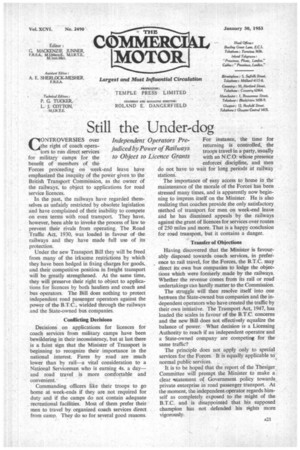Still the Under-dog
Page 99

If you've noticed an error in this article please click here to report it so we can fix it.
CONTROVERSIES over the right of coach opera tors to run direct services for military camps for the benefit of members of the Forces proceeding on week-end leave have emphasized the inequity of the power given to the British Transport Commission, as the owner of the railways, to object to applications for road service licences.
In the past, the railways have regarded themselves as unfairly restricted by obsolete legislation and have complained of their inability to compete on even terms with road transport. They have, however, been able to invoke the process of law to prevent their rivals from operating. The Road Traffic Act, 1930, was loaded in favour of the railways and they have made full use of its protection.
Under the new Transport Bill they will be freed from many of the irksome restrictions by which they have been hedged in fixing charges for goods, and their competitive position in freight transport will be greatly strengthened. At the same time, they will preserve their right to object to applications for licences by both hauliers and coach and bus operators. The Bill does nothing to protect independent road passenger operators against the power of the B.T.C., wielded through the railways and the State-owned bus companies.
Conflicting Decisions Decisions on applications for licences for coach services from military camps have been bewildering in their inconsistency, but at last there is a faint sign that the Minister of Transport is beginning to recognize their importance in the national interest. Fares by road are much lower than by rail—a vital consideration to a National Serviceman who is earning 4s. a day— and road travel is more comfortable and convenient.
Commanding officers like their troops to go home at week-ends if they are not required for duty and if the camps do not contain adequate recreational facilities. Most of them prefer their men to travel by organized coach services direct from camp. They do so for several good reasons. For instance, the time for returning is controlled, the troops travel in a party, usually with an N.C.O. whose presence enforces discipline, and men do not have to wait for long periods at railway stations.
The importance of easy access to home in the maintenance of the morale of the Forces has been stressed many times, and is apparently now beginning to impress itself on the Minister. He is also realizing that coaches provide the only satisfactory method of transport for men on week-end leave and be has dismissed appeals by the railways against the grant of licences for services over routes of 250 miles and more. That is a happy conclusion for road transport, but it contains a danger.
Transfer of Objections Having discovered that the Minister is favourably disposed towards coach services, in preference to rail travel, for the Forces, the B.T.C. may direct its own bus companies to lodge the objections which were formerly made by the railways. Whether the revenue comes from its rail or road undertakings can hardly matter to the Commission.
The struggle. will then resolve itself into one between the State-owned bus companies and the independent operators who have created the traffic by their own initiative. The Transport Act, 1947, has loaded the scales in favour of the B.T.C. concerns and the new Bill does not effectively equalize the balance of power. What decision is a Licensing Authority to reach if an independent operator and a State-owned company are competing for the same traffic?
The principle does not apply only to special services for the Forces. It is equally applicable to normal public services. • „ It is to be hoped that the report of the Thesiger Committee will prompt the Minister to make a clear statement of Government policy towards , private enterprise in road passenger transport. At the moment, the independent operator regards himself as completely exposed to the might of the B.T.C. and is disappointed that his supposed champion has not defended his rights more vigorously.
























































































































































